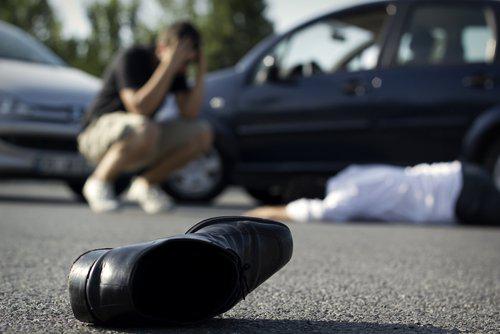Recent Blog Posts
Framed by a Fly: Forensic Scientist Says Flies Are Capable of Transporting DNA Evidence
 Inside a courtroom, and to a jury, a DNA sample almost always seals the case against an alleged criminal; it would seem appropriate, considering how the odds of a false identification is lower than one in 10 million. But real and valid cases of DNA contamination - from the “trace” DNA samples that can be transferred by a mere handshake, to a single intact sperm inadvertently finding its way onto a slide containing a woman’s vaginal secretions – suggest that our reliance on DNA evidence has become more than slightly concerning.
Inside a courtroom, and to a jury, a DNA sample almost always seals the case against an alleged criminal; it would seem appropriate, considering how the odds of a false identification is lower than one in 10 million. But real and valid cases of DNA contamination - from the “trace” DNA samples that can be transferred by a mere handshake, to a single intact sperm inadvertently finding its way onto a slide containing a woman’s vaginal secretions – suggest that our reliance on DNA evidence has become more than slightly concerning.
DNA Evidence – Then and Now
When DNA analysis first emerged, a decent amount of evidence was needed to extract just a partial profile (think a blood stain the size of a quarter). But, as modern science has improved, the sample of DNA needed to supply incriminating evidence has decreased exponentially. Today, an entire profile can be created with a sample the size of a pinhead. Unfortunately, that improvement has come at a price; and quite often that price is the wrongful conviction of an innocent person.
Sudden Infant Death Syndrome and the Charges Parents May Face
 Each year, more than 3,500 children die of Sudden Infant Death Syndrome (SIDS), which is the sudden death of an infant that cannot be explained after a thorough investigation. So much about what causes SIDS is still unknown. The cause of many SIDS deaths remains a mystery. Unfortunately, some SIDS deaths end up resulting in criminal charges for parents or caretakers, compounding tragedy on top of tragedy.
Each year, more than 3,500 children die of Sudden Infant Death Syndrome (SIDS), which is the sudden death of an infant that cannot be explained after a thorough investigation. So much about what causes SIDS is still unknown. The cause of many SIDS deaths remains a mystery. Unfortunately, some SIDS deaths end up resulting in criminal charges for parents or caretakers, compounding tragedy on top of tragedy.
Mother Convicted of Manslaughter
In 2014, a North Virginia mother swaddled her baby, placed him face down on a couch cushion, and then fell asleep herself. When she awoke, she found her baby boy unconscious. Just a couple months later, the mother was arrested on charges of manslaughter. She eventually plead guilty to those charges and was ordered to complete three years of probation or face five years of imprisonment. Cases relating to criminal charges from SIDS involve parents and/or caregivers failing to follow safe sleep practices, such as giving the baby its own sleeping space or placing the baby on its back to sleep. Other cases involve parents/caregivers who seem to have done everything possible to reduce the risk to their babies. Yet in rare circumstances, they, too, have faced charges. The stress and trauma of having to endure such charges in the midst of such a great and unpreventable loss is undoubtedly devastating.
Kosar DUI - What is His Defense?
In late September, was reported that former Cleveland Browns Quarterback, Bernie Kosar, had been arrested on a DUI charge. The police report indicated that he was pulled over at 2:40 in the morning after speeding through a construction zone (74 in a 50 mph speed zone).
When the office approached the car and asked if he had been drinking, Kosar stated that "he was helping a friend." Additionally, when asked for his license, Kosar handed the officer two credit cards.
The officer on the scene also reported the strong odor of alcohol and slurred speech upon talking to Kosar and requested that he take the standard field sobriety tests. While Kosar refused to take the portable breath test, suggesting he had been advised never to take these, he did agree to take other standard tests. After Kosar failed some of the other field sobriety tests, the incident became even more interesting. Kosar attributed his failures to the numerous surgeries on his ankles and knees "because his line could not block." The day after the incident, Kosar's attorney filed a plea of not-guilty on behalf of his client.
Backdoor Prohibition? The Road to 0.05
 By Attorney Steven C. McGaver
By Attorney Steven C. McGaver
Recently, the National Transportation Safety Board recommended that all fifty states should lower the legal blood alcohol limit from 0.08 g/100 ml to 0.05 g/100 ml. According to the NTSB, at .05 BAC, some drivers begin having difficulties with depth perception and other visual functions. As expected, the American Beverage Institute immediately cried foul. Managing director Sarah Longwell said: "This recommendation is ludicrous. Moving from 0.08 to 0.05 would criminalize perfectly responsible behavior. Further restricting the moderate consumption of alcohol by responsible adults prior to driving does nothing to stop hardcore drunk drivers from getting behind the wheel." The proposal also met criticism from some surprising opponents, Mothers Against Drunk Driving of Texas, which successfully lobbied to change the limit from .10 to .08 in 1999, said pushing to lower the rate is not on its radar, and according to the Milwaukee Journal Sentinel, Milwaukee County Sheriff, David Clarke expressed his opposition to the proposal, stating, "What we're seeing from analysis of our data is that the heart of the problem is that Wisconsin doesn't criminalize the first offense. The first offense of drunken driving should be a misdemeanor. On average, many of those arrested have a level of 0.15, or nearly twice the legal limit, and some are even higher. People we stop, test and arrest are drunk out of their minds. There's nothing in the NTSB recommendations that talks about stiffer sentences, and that's what's needed. Our problem is multiple-time offenders, and we don't send a strong enough message after the first time."
Wisconsin Implements Alcohol Biomarker Testing
 The state of Wisconsin is pursuing a new method of curbing repeat offenses for drunk driving. State officials are going to begin testing people with repeat OWI convictions for “alcohol biomarkers.” These are residual molecules that can show the history of a person's drinking. The idea is to use these biomarkers to attempt to identify people who are at a higher risk for continuing to drive drunk. Some research from the University of Wisconsin Milwaukee already suggests that these sorts of tests, combined with computer analytics, can help predict people's drunk driving tendencies.
The state of Wisconsin is pursuing a new method of curbing repeat offenses for drunk driving. State officials are going to begin testing people with repeat OWI convictions for “alcohol biomarkers.” These are residual molecules that can show the history of a person's drinking. The idea is to use these biomarkers to attempt to identify people who are at a higher risk for continuing to drive drunk. Some research from the University of Wisconsin Milwaukee already suggests that these sorts of tests, combined with computer analytics, can help predict people's drunk driving tendencies.
What Alcohol Biomarker Testing Is
Alcohol biomarkers are a new type of test designed to determine a person's long-term drinking history. Ordinary alcohol tests check for the presence of alcohol in the blood, but alcohol only lasts in the blood for a matter of hours before it is gone. This makes it impossible to learn about a person's alcohol intake by directly testing for alcohol. However, alcohol does not simply vanish from the blood. Instead, it is metabolized. This means that the body converts the molecules of alcohol into other molecules. These molecules last much longer in the body, finding their way into the drinker's fingernails, which a chemist can then examine.
Drunk Driving Accidents: Bad Memories That Last Forever
 Recently, a significant amount of civil lawsuits involving personal injuries caused by drunk drivers are being filed with state courts around the country, including Wisconsin. Sadly, the harsh criminal penalties and lengthy periods of incarceration associated with drunk driving have not done enough to deter drunk drivers from getting behind the wheel.
Recently, a significant amount of civil lawsuits involving personal injuries caused by drunk drivers are being filed with state courts around the country, including Wisconsin. Sadly, the harsh criminal penalties and lengthy periods of incarceration associated with drunk driving have not done enough to deter drunk drivers from getting behind the wheel.
The Centers for Disease Control and Prevention estimates that 30 individuals die every day in motor vehicle accidents across the United States. In 2013, approximately 10,000 individuals were killed in automobile accidents related to alcohol-impaired drivers. Wisconsin has the highest rate of drunk driving out of all other states in the United States and over 33,000 Wisconsin citizens were convicted of a drunk driving-related offense in 2012. During that same year, 223 individuals were killed and over 3,000 suffered injuries because of drunk drivers.
Marijuana and OWI Charges
 You can be charged with OWI in Wisconsin any time you operate a motor vehicle with a detectable amount of a restricted controlled substance in your blood. Wisconsin is therefore known as a “zero tolerance” state when it comes to driving under the influence of marijuana.
You can be charged with OWI in Wisconsin any time you operate a motor vehicle with a detectable amount of a restricted controlled substance in your blood. Wisconsin is therefore known as a “zero tolerance” state when it comes to driving under the influence of marijuana.
How and under What Circumstances Do the Police Test for Marijuana Use?
When there is suspicion of drugged driving, Wisconsin police test for Delta-9-THC, an active ingredient in cannabis, which passes through the body much faster than other inert metabolites of cannabis. If at the time you were pulled over and tested positive for cannabis use, you had a valid prescription for marijuana, then you can raise that as an affirmative defense. Otherwise, however, there is a strict liability standard, even if what is in your system was from use several hours or days prior.
Why You Should Request an Administrative Hearing If Arrested for OWI
 Everybody makes mistakes from time to time, and when there is alcohol involved, mistakes are more likely. One major mistake that Wisconsin residents often make leads to an OWI charge (operating while intoxicated). If you have been arrested for OWI, it is very important to act quickly and retain an experienced OWI lawyer to help you avoid serious consequences. An important early step in this process is to request an administrative hearing after your arrest.
Notice of Intent to Suspend Operating Privileges
If you are arrested for OWI in Wisconsin, you will receive a pink notice, which is titled Notice of Intent to Suspend Operating Privilege. That notice shows your test results from a breathalyzer test or chemical test, and is a temporary (30 day) driver’s license. Accompanying the notice is a yellow form titled Administrative Review Request. This is how you receive notice of your right to request an administrative hearing.
What Is an Administrative Hearing?
If a breathalyzer test is administered at the scene of your arrest, then your Notice of Intent to Suspend will be provided to you at the police station. That means you have only 10 days to submit your Administrative Review Request and request an administrative hearing. If, however, you are given chemical tests at the time of your OWI, it may take two to three weeks for the results to be returned. Once the results are returned to the police, you will be mailed your Notice of Intent to Suspend, and you will have 13 days from when it is mailed to request an administrative hearing. It is very important you request an administrative hearing; if you do not do so, you might lose your license before your court date for OWI has arrived.
What Will Happen at the Administrative Hearing?
Once the Administrative Review Request is submitted, the DMV will contact you or your attorney to schedule the review within 30 days. Your hearing will be held at the DMV that is closest to the scene of your arrest, and an employee of the DMV serves as prosecutor, judge, and jury over your case.
The DMV employee will look at all of the evidence presented, including whether the traffic stop was legal, if there was a reasonable belief that you were intoxicated and probable cause to arrest you, whether all tests were properly administered, whether you were driving a commercial vehicle or private vehicle at the time of your arrest, and whether you have a valid THC prescription (or a valid prescription for any other drug for which you tested positive on a chemical test). This is just a sample of what is looked at, and if there is any other evidence relevant to the hearing, your lawyer will submit it at that time.
What Happens If You Lose the Hearing?
Losing the hearing means losing your license. Even if you later win at trial, or the charges are later dismissed, you will lose your driving privileges if you lose your administrative hearing. All hope is not totally lost if you do not prevail at this hearing, as another hearing can be requested to challenge the outcome. Not requesting the administrative hearing guarantees you lose your license until your trial.
What Happens If You Win the Hearing?
Winning the administrative hearing might be temporary, but if you win, you get to keep your license for now. This is important, as it allows you to keep driving to work, school, or wherever your responsibilities require, and minimizes disruption to your routine and the routine of your loved ones until it is absolutely necessary. Of course, there is always a possibility that your charges are dismissed, lowered, or you prevail at trial, which means that by winning the administrative hearing, you will never face the daily disruption of license suspension. If you are later convicted at trial, you will lose your license for the statutory period, but at least in the interim, you get to keep driving as long as possible if you prevail in your administrative hearing.
Everybody makes mistakes from time to time, and when there is alcohol involved, mistakes are more likely. One major mistake that Wisconsin residents often make leads to an OWI charge (operating while intoxicated). If you have been arrested for OWI, it is very important to act quickly and retain an experienced OWI lawyer to help you avoid serious consequences. An important early step in this process is to request an administrative hearing after your arrest.
Notice of Intent to Suspend Operating Privileges
If you are arrested for OWI in Wisconsin, you will receive a pink notice, which is titled Notice of Intent to Suspend Operating Privilege. That notice shows your test results from a breathalyzer test or chemical test, and is a temporary (30 day) driver’s license. Accompanying the notice is a yellow form titled Administrative Review Request. This is how you receive notice of your right to request an administrative hearing.
What Is an Administrative Hearing?
If a breathalyzer test is administered at the scene of your arrest, then your Notice of Intent to Suspend will be provided to you at the police station. That means you have only 10 days to submit your Administrative Review Request and request an administrative hearing. If, however, you are given chemical tests at the time of your OWI, it may take two to three weeks for the results to be returned. Once the results are returned to the police, you will be mailed your Notice of Intent to Suspend, and you will have 13 days from when it is mailed to request an administrative hearing. It is very important you request an administrative hearing; if you do not do so, you might lose your license before your court date for OWI has arrived.
What Will Happen at the Administrative Hearing?
Once the Administrative Review Request is submitted, the DMV will contact you or your attorney to schedule the review within 30 days. Your hearing will be held at the DMV that is closest to the scene of your arrest, and an employee of the DMV serves as prosecutor, judge, and jury over your case.
The DMV employee will look at all of the evidence presented, including whether the traffic stop was legal, if there was a reasonable belief that you were intoxicated and probable cause to arrest you, whether all tests were properly administered, whether you were driving a commercial vehicle or private vehicle at the time of your arrest, and whether you have a valid THC prescription (or a valid prescription for any other drug for which you tested positive on a chemical test). This is just a sample of what is looked at, and if there is any other evidence relevant to the hearing, your lawyer will submit it at that time.
What Happens If You Lose the Hearing?
Losing the hearing means losing your license. Even if you later win at trial, or the charges are later dismissed, you will lose your driving privileges if you lose your administrative hearing. All hope is not totally lost if you do not prevail at this hearing, as another hearing can be requested to challenge the outcome. Not requesting the administrative hearing guarantees you lose your license until your trial.
What Happens If You Win the Hearing?
Winning the administrative hearing might be temporary, but if you win, you get to keep your license for now. This is important, as it allows you to keep driving to work, school, or wherever your responsibilities require, and minimizes disruption to your routine and the routine of your loved ones until it is absolutely necessary. Of course, there is always a possibility that your charges are dismissed, lowered, or you prevail at trial, which means that by winning the administrative hearing, you will never face the daily disruption of license suspension. If you are later convicted at trial, you will lose your license for the statutory period, but at least in the interim, you get to keep driving as long as possible if you prevail in your administrative hearing.
If you are facing OWI charges, don’t hesitate to contact our skilled Milwaukee criminal defense attorneys today. We will aggressively advocate on your behalf.
What You Need to Know about Field Sobriety Tests
 If you are pulled over and the police suspect you are operating your vehicle under the influence of alcohol, you will likely be asked to perform field sobriety tests. The three tests most commonly used by law enforcement in Wisconsin and nationwide to determine if you are operating your vehicle while intoxicated (OWI), in order of reliability are; the horizontal gaze nystagmus, the walk and turn, and the one leg stand. If administered properly, each test can help law enforcement determine if a driver is under the influence of alcohol or other drugs,.
If you are pulled over and the police suspect you are operating your vehicle under the influence of alcohol, you will likely be asked to perform field sobriety tests. The three tests most commonly used by law enforcement in Wisconsin and nationwide to determine if you are operating your vehicle while intoxicated (OWI), in order of reliability are; the horizontal gaze nystagmus, the walk and turn, and the one leg stand. If administered properly, each test can help law enforcement determine if a driver is under the influence of alcohol or other drugs,.
The Horizontal Gaze Nystagmus (HGN)
An HGN test is the most accurate of all of the field sobriety tests, with a 77 percent accuracy rate in detecting high blood alcohol content (BAC). Nystagmus means involuntary jerking or bouncing of the eyeball, with pupils appearing to be pulled back towards the center of the eye. This can be caused by several things, most notably alcohol use. It can also happen as a result of certain drugs that depress the central nervous system. The higher the concentration of blood or alcohol in the blood, the more noticeable the nystagmus is.
SAFE Act: Are Heavier Trucks Coming to Wisconsin Roadways
 September of 2015 brought a new bill for Congress to contemplate regarding trucks on United States highways. Wisconsin Representative Reid Ribble introduced a bill to allow larger, heavier trucks on American roadways, called the Safe, Flexible, and Efficient (SAFE) Trucking Act (the SAFE Act). The SAFE Act is allegedly drafted in a manner that will increase highway productivity and decrease the amount of trucks on the road. The bill was drafted in response to a study conducted by the Department of Transportation earlier this year. That study, titled “Comprehensive Truck Size and Weight Limits Study,” was done under federal law requiring such studies be completed under the Moving Ahead for Progress in the 21st Century Act.
September of 2015 brought a new bill for Congress to contemplate regarding trucks on United States highways. Wisconsin Representative Reid Ribble introduced a bill to allow larger, heavier trucks on American roadways, called the Safe, Flexible, and Efficient (SAFE) Trucking Act (the SAFE Act). The SAFE Act is allegedly drafted in a manner that will increase highway productivity and decrease the amount of trucks on the road. The bill was drafted in response to a study conducted by the Department of Transportation earlier this year. That study, titled “Comprehensive Truck Size and Weight Limits Study,” was done under federal law requiring such studies be completed under the Moving Ahead for Progress in the 21st Century Act.








